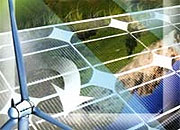The company’s latest report* states that of the various support mechanisms in Europe, FiTs have emerged as a particularly effective way of promoting the renewable industry, with wind and solar power benefiting most from these measures.
Siddhartha Raina, GlobalData’s Senior Analyst covering Power, says the European Union (EU) directive on renewable energy, which has set a target for each member state to increase its renewable energy share to 20% of total consumption by 2020, remains crucial to continuing industry growth.
Raina explains: “The National Renewable Energy Action Plan provides mandatory targets for each EU member state for the overall share of renewable sources in gross energy consumption, and is targeting a 10% share of renewables in transport by 2020.
“To achieve these goals, FiTs are being used to promote renewable energy in Germany, France, Italy, the UK, Spain, Austria, the Netherlands and Turkey. Some European countries are also using quota obligations, premium tariffs, tax incentives, investment support, net metering, and green certificates.”
GlobalData’s report also states that renewables accounted for around 40% of the EU’s total power generation capacity added in 2014, with Germany the clear leader for installed capacity.
Raina continues: “Germany’s renewable energy sector was initially boosted by the introduction of the Electricity Grid Feed Law in 1991, and further helped by several key policies since, including the Renewable Energy Sources (Erneuerbare Energie Gesetz, EEG) Act in 2000.
“The main objectives of the EEG Act, which was amended in 2004, 2009 and 2011, have been to develop a sustainable energy supply at a reduced cost, protect the climate by reducing emissions, and promote renewables.”
The impact of Germany’s renewable energy policies has been clear to see. The country ranked third globally in 2014 in terms of cumulative installed renewable capacity, including hydropower, with 90.3 Gigawatts by the end of the year. Additionally, Germany ranked first in cumulative solar PV capacity and third in cumulative wind power capacity.
См. также:
О реализации энергосервисных проектов в России
Лучше платить за теплоэнергию вовремя
Функциональное рабочее место
Валютная пара EUR/USD: ожидается рост евро


